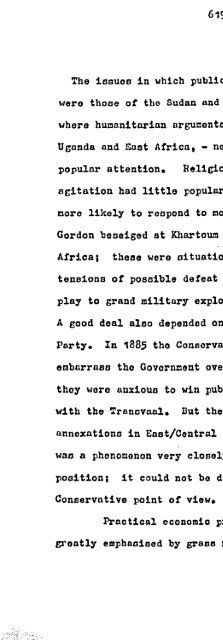- Page 1 and 2:
University of Warwick institutional
- Page 4:
is ABSTRACT. The thesis traces the
- Page 8:
111 , Midlothian opposition to Disr
- Page 12:
ö. The arrival of Jima Imperialism
- Page 16:
elieve. " (1} 2. In an article enti
- Page 20:
1, The legitimate Empire also inclu
- Page 24:
6" with the formation of the Coloni
- Page 28:
Parochialists, '" (1) 8. This feeli
- Page 32:
1O, Empire. The two often went toge
- Page 36:
12. The Scramble for Africa was und
- Page 40:
14. philanthropists an among freebo
- Page 44:
16« a membor of a groat Empire. "
- Page 48:
Britioh workmen. (1) 180 Another po
- Page 52:
20. I my Honourable friend believe
- Page 56:
22. There were some areas of profit
- Page 60:
24. of Coluzibia, while atop the wh
- Page 64:
26. alternative before England. " (
- Page 68:
280, J. A. Hobson and D. G. Ritchie
- Page 72:
30. relieved of tho'necessity of la
- Page 76:
32. prospectors are chipping rocks
- Page 80:
3kß Pride in Empire was illustrate
- Page 84:
36. sport among an gorontially apor
- Page 88:
38. The prostiEe of war-like deeds
- Page 92:
40. can't have the armaments of Emp
- Page 96:
1*2. constitution and oatnbliohod C
- Page 100:
kZ" who want big dividends to be ea
- Page 104:
Z6" ghat will we got from the Zulu
- Page 108:
48. Midlothian nrinai lan and the f
- Page 112:
50. object to our annexation. " (1)
- Page 116:
52. cotirorce in Ccntrul A rica$ bl
- Page 120:
51b" the ßocro, the attempt to mak
- Page 124:
56, confounds these with considerat
- Page 128:
58. Cone into the desert that they
- Page 132:
pence movement $-U. 60. J. 4iilaon
- Page 136:
62. It was realised that Imperialis
- Page 140:
6L" Corzittce travelled to provinci
- Page 144:
66o Liberals were beginning to dist
- Page 148:
68. roforr oro liko Wilfred Lawson
- Page 152:
%4" Anglo-French , Dual Control in
- Page 156:
72. provocation afforded by the Ale
- Page 160:
7u. Liberale had to be convinced th
- Page 164:
76. led me to acquiesce in all, ttt
- Page 168:
? 8. Government; he suffered a bitt
- Page 172:
80. Sudan. Morley began to prose fo
- Page 176:
82. Make intervention in the Sudan
- Page 180:
8Lr, Ilartington and Celboroo, who
- Page 184:
86" "that they contcoplatod roving
- Page 188:
88, becauno they wcro porcuad9d tha
- Page 192:
900 of reconquering the Soudan. " (
- Page 196:
92. tempor of the co sottelty of En
- Page 200:
94; and. hunting `with tho Jingoca,
- Page 204:
9G* Most of the opposition to the w
- Page 208:
98* contemplate this, Tho Liberal o
- Page 212:
100. and was in no danger of being
- Page 216:
102" (the local 14. P. ) were in th
- Page 220:
io4.. tranquillity always seemed as
- Page 224:
IGG. Gladstone had never "lacked pr
- Page 228:
los. other Yorkshire M. Po. Cre$ka,
- Page 232:
110. resolution was then passed by
- Page 236:
112. opinion favoured a withdrawal
- Page 240:
114. capitalism, The Social-Democra
- Page 244:
116 0 and our Indian Empire has bee
- Page 248:
ii8. general Ionconforr3ioto were d
- Page 252:
120. public qucctiona, .. the rocul
- Page 256:
122. . to justify another. A few be
- Page 260:
124« retire ".. until our troops h
- Page 264:
126. and leave the äoudaneco to th
- Page 268:
I 128. Where was soze disagreement
- Page 272:
133. Ile was more personally involv
- Page 276:
132. area as far as British interes
- Page 280:
1: 4. Anti-war or rAninati, on 082.
- Page 284:
136. There was also the Anti-Aggreo
- Page 288:
138, Workmen's Peace Actociation in
- Page 292:
h1+OM In Birmingham the Anti-war Vi
- Page 296:
112. . The first of the London neet
- Page 300:
144. Positivists and 1M. PS. and wi
- Page 304:
146. On 8th Fobruary 19859 T. P. O'
- Page 308:
i 8. Erjpt and the Egyptian bondhol
- Page 312:
150. Liberals, though Rev. Horace W
- Page 316:
152. in 1882, A11en'e reaction to t
- Page 320:
154. seek to employ force. " (1) In
- Page 324:
156. Thcro^ were considerable dtffe
- Page 328:
158: the Government were to blame f
- Page 332:
160. Landon, ff. Fl. Stanley the ex
- Page 336:
162. The explorers Vernon, Lovett C
- Page 340:
164" for some years for per1iaaion
- Page 344:
166, in Egypt. A few buninessmcn wr
- Page 348:
1Gß;, The Patriotic Association ha
- Page 352:
170,, necessary to protect the Indi
- Page 356:
172. Conservatives felt that Olsdst
- Page 360:
174, o It wes intensified by the "h
- Page 364:
176. Dritich troops" in the Red Sea
- Page 368:
178, own scheme in favour of this a
- Page 372:
1SU . greatest since the Indian Mut
- Page 376:
182, Richard Temple, in an article
- Page 380:
18+. The Patriotic Association hold
- Page 384:
lack borders. 186. Even Radicals ad
- Page 388:
188. approving of hie disregard of
- Page 392:
19©« Sinclair Macdonald of St, St
- Page 396:
the and of 1886, 192. (1) and comma
- Page 400:
194, In aatoninhio ly bad verao$ th
- Page 404:
196. At a Patriotic Association mee
- Page 408:
198, be found in ßordonlo attitude
- Page 412:
200, generated by the Conservative
- Page 416:
202. Mention Iiouee, with the Mayor
- Page 420:
zoo. which became the foundation of
- Page 424:
206. In Scotland Felkin was also wo
- Page 428:
208. waa*followed by a controversy
- Page 432:
210. is the peculiar characteristic
- Page 436:
212. expansion in Africa+ began to
- Page 440:
21k, Liverpool and Manchester firmn
- Page 444:
" 216. example helped to form the f
- Page 448:
218. exploration has done* would be
- Page 452:
220. The only Chamber which gooca t
- Page 456:
222. Scotland at Blantyre iný the
- Page 460:
224, tended to complain of the negl
- Page 464:
226, emerge in East Africa. The Por
- Page 468:
228* the patterns of tribal life. A
- Page 472:
`230. allowed to continue, co long
- Page 476:
232. with African labour, A petitio
- Page 480:
234. Society asserted that the Port
- Page 484:
236, 1889,. " "The truth is, we mus
- Page 488:
238" had no intention of taking on
- Page 492:
240. Portuguese would then be asked
- Page 496:
242, promoters of the fund and the
- Page 500:
244. when it suggested that interes
- Page 504:
246* thinking in terms of obtaining
- Page 508:
a8, Friends anti-slavery committee,
- Page 512:
250. Miuuionary Society and Anti-.
- Page 516:
withdrawing from Uganda. 252" There
- Page 520:
254. previously Mckenzie had writte
- Page 524:
256, < included "purses, Cold tantc
- Page 528:
258. part, which commits the Societ
- Page 532:
26dß But the public roaponoo to th
- Page 536:
262« members of the Mackinnon fami
- Page 540:
4. S. S. to contribute 264, to psrc
- Page 544:
il roceivq tho public which has Lib
- Page 548:
268. Africa, mainly to congrogation
- Page 552:
270, . Thcuo first states of agitat
- Page 556:
? 72. trade in üeanda, 'or any vlt
- Page 560:
27 4., be requested to arrange a do
- Page 564:
276. interview was not very fruitfu
- Page 568:
278. ctCnntureo and torwird it to t
- Page 572:
280. The first pariah petition arri
- Page 576:
2820 Diocesan Conference they resol
- Page 580:
284. ctutez euta,, The A*8: 5, also
- Page 584:
286. the quaker Freeidout of the A,
- Page 588:
288, dcnouncing the 'hire of niavos
- Page 592:
the Conpanys (1) 2900 and at the 18
- Page 596:
292. The anti-slavery ardent was th
- Page 600:
294s Scotland where the Church of E
- Page 604:
296. support for ceotingu which may
- Page 608:
298. and that meeting inotond of be
- Page 612:
300. clam and army and naval office
- Page 616:
302" No thought the Government shou
- Page 620:
30k, to Engluund$ he launched hin c
- Page 624:
306" The economic orgurento (or the
- Page 628:
3089 Ior was Lugard especially succ
- Page 632:
310, the former of, course much mor
- Page 636:
°312. The Company certainly tried
- Page 640:
31k. Only the Tides gave a really p
- Page 644:
'j16o ßladstonian party it they pe
- Page 648:
318. nevertheless, thought that opi
- Page 652:
320. converts and the threatened re
- Page 656:
322. Catholic interests in Britain
- Page 660:
324, Deanery meetings or other Chur
- Page 664:
326. in Africa "but solely from the
- Page 668:
328. there were only fifty-two vote
- Page 672:
330" could cryetallico. By the time
- Page 676:
332, literature of the period "...
- Page 680:
ut ju3t British, " (1) 334. Another
- Page 684:
336, defeated and captured. The Rai
- Page 688:
338. "The troopers were received wi
- Page 692:
340. was some ambiguity about Jamea
- Page 696:
342, who characteristically-urged t
- Page 700:
344. was not only Foreign Secrotiry
- Page 704:
346. Watch that black 11 uco soldie
- Page 708:
348* 20 The Sudan expedition. and F
- Page 712:
350. the rule of this very bad an t
- Page 716:
352. Faehoda! and on the 3rd Novenb
- Page 720:
354. bringe down tho houno. º' (1)
- Page 724:
356, British troops was an prevalen
- Page 728:
356. cutting out horoen of oneto yo
- Page 732:
tifUerence. " t1) 360. A very stron
- Page 736:
362+ French will be allowed to brea
- Page 740:
364. opinions on this occasion. Bee
- Page 744:
366i periloun to the party, because
- Page 748:
368. at Fife, asserted that the Sud
- Page 752:
f 370. of England debating society,
- Page 756:
372. The anti-war resolutions were
- Page 760:
37k. A few days later at an Exeter
- Page 764:
376. behalf of the society urging t
- Page 768:
378. fed and consequently badly edu
- Page 772:
380, perhaps strongly anti-Imporial
- Page 776:
3$2. minority, coven lese than in F
- Page 780:
him on every aide. " 384. (1) There
- Page 784:
386. Public opinion up to the outbr
- Page 788:
388. subjects kept permanently in t
- Page 792:
390. the conditions which the Briti
- Page 796:
392. altered when reeolutionc not s
- Page 800:
39kß of "flilnor" meotinge in the
- Page 804:
396. rocolutions as a whole. Fiftee
- Page 808:
398. amorality, fair doaling and re
- Page 812:
400. The Baptist and Congregational
- Page 816:
402. than it-bad been in 1881.20 do
- Page 820:
40, the Cuaker reeol. utione and he
- Page 824:
40 6. Friends were divided on the w
- Page 828:
408. that of the ! onconformiota ca
- Page 832:
410. diocese who had never become r
- Page 836:
4126 411 the comforts and convenien
- Page 840:
414i "There has boon a collision of
- Page 844:
416. In content the Liberal reeolut
- Page 848:
We. meeting in the Tenperunco Hall
- Page 852:
420" Wilson also spoke at public me
- Page 856:
+22o Boers had been defeated. He al
- Page 860:
4249 official Liberale, but- by, 18
- Page 864:
426, Peace meetings in Newcastle we
- Page 868:
there was mono objection. 428, This
- Page 872:
43o. Bryce was still substantially
- Page 876:
432.. It oomo Liberala vacillated b
- Page 880:
431f. or "cane" Imperialist, - he w
- Page 884:
436. and affirmed that he would vot
- Page 888:
438. and nine additional reoolution
- Page 892:
44Q. can only end in one way. I rej
- Page 896:
442. home was underplayed* The desi
- Page 900:
444. Conoervative Clubs received a
- Page 904:
w-v Toynbog Ball issued a manifesto
- Page 908:
Clark. {1) II8, At a Bethnal. Breen
- Page 912:
45o. Socialist body. Tunbrigo Wella
- Page 916:
452. boon dropped at the 1884 Conve
- Page 920:
k k454. opposition to the war. They
- Page 924:
Ilo t ont and rocerviatn. 1, C! Twe
- Page 928:
Inutituto Union. (1) X58" ,A circul
- Page 932:
460. , impossible for the meeting t
- Page 936:
462. National Memorial against the
- Page 940:
464. a ? r. Gauntlett 162 from Exet
- Page 944:
466. secured the approbation of the
- Page 948:
468. hundred and fifty cent$ and th
- Page 952:
470. Hang conga, waved Union Jacko
- Page 956:
472. of Wales were 1e jingoistic th
- Page 960:
474. ronco nativity in the first-ye
- Page 964:
476. the Uitlandera, though it also
- Page 968:
478s was later built up. Sixty two
- Page 972:
*0. It included a number of people
- Page 976:
483. explorer Soloue was a founder
- Page 980:
484s, carried knives, others bludre
- Page 984:
486" open air teotingn in victoria
- Page 988:
488: In the Midlands there were pea
- Page 992:
490. few months of 100. The Committ
- Page 996:
492, Wilson'a and fladdinon'a effor
- Page 1000:
494. place a small international ol
- Page 1004:
1196. on British territory. A. nati
- Page 1008:
498« considerations there was the
- Page 1012:
500. the disintegration of which wo
- Page 1016:
502. Morley M. P. for Montrose Burg
- Page 1020:
504s deal of its earlier impetus. B
- Page 1024:
50bß . that meetings would not be
- Page 1028:
X08. or two, but they lived so far
- Page 1032:
510, Liberal Ancociation in March h
- Page 1036:
512" the Ruaholiffo divioton of flo
- Page 1040:
514. illustrated by the case of Hen
- Page 1044:
5160 including nine from the anti-s
- Page 1048:
518. F. W. first who had helped Mor
- Page 1052:
working man; (1) 520, this may havo
- Page 1056:
522" Both the 'j. h. 'r# and the I.
- Page 1060:
I 5214., Some Z. il. P. members mig
- Page 1064:
526. Macdonald and Sydney Oliver da
- Page 1068:
528. The Fabians roproacntod more t
- Page 1072:
530. directed as much against Liber
- Page 1076:
532, ° Spender wrote to Lannbury b
- Page 1080:
534" a common anti-war attitude as
- Page 1084:
i4ovidence. 536. A few Uoaloyane al
- Page 1088:
533. and voicing nifillar contthout
- Page 1092:
540" peace orCanisation, in Aberde
- Page 1096:
542. rather than a specific protect
- Page 1100:
544. However the ma j: ritt' of Fri
- Page 1104:
546o The moral opposition to Imperi
- Page 1108:
548. early victories of the Boers w
- Page 1112:
5500 those in a number of other tow
- Page 1116:
552f demonstration. This took the f
- Page 1120:
ä51k., and Ladysmith and the wordi
- Page 1124:
memorial said It Christ surrounded
- Page 1128:
C 55ß. ontit1e "Some thing to reme
- Page 1132:
560. the Boers down to the ground;
- Page 1136:
562. South Africa was very ouch of
- Page 1140:
. 564. anti-inperialicr in the Libe
- Page 1144:
566. to him on Trafalgar Day that t
- Page 1148:
568. ,. Glasgow$ though the last tw
- Page 1152:
570, at Edinburgh and Dundee which
- Page 1156:
572. This was in spite of the fact
- Page 1160:
574. of the Chief Constable before
- Page 1164:
57G. the crowd as well to do young
- Page 1168:
5789 a breakfast at the tJeetminste
- Page 1172:
580. incidents took place in r! c.
- Page 1176:
*'/ ., 582. bells to celebrate Lady
- Page 1180:
584. to refuse to hear then and to
- Page 1184:
586. cofloctora of signaturoa, The
- Page 1188:
5880 Most riots had some organicati
- Page 1192:
5900 Door meeting and that It was e
- Page 1196:
ý¢, 592" those owned by victims o
- Page 1200: 594. Transvaal. A screen was then l
- Page 1204: pickpockets, (1) 596.. But Alatchto
- Page 1208: 598. the at, *Ui $, Local cuthoriti
- Page 1212: Liberale in its 60©. , urcuance, t
- Page 1216: Cozi (nevonty-two in Scotland and t
- Page 1220: G04" nearly two and a half million
- Page 1224: 606,,. George and C, P. Scott h11 k
- Page 1228: 608. positions - an he wrote "i had
- Page 1232: 610. While G. C. Clarke the Liboral
- Page 1236: 612. am an Imperialist in these thi
- Page 1240: 614. Conclusion. By 1900 moat Liber
- Page 1244: 616" wrong fgr all strata of societ
- Page 1248: 618. by fringe groups such as the P
- Page 1254: $21. in the African scramble was a
- Page 1258: 623. were an increasing number o: i
- Page 1262: Airondix 625. It 1. The 12 Conserva
- Page 1266: Conservative Caine, 627. Sheffield
- Page 1270: fritinh Muneum P3 62l W. E. Gladsto
- Page 1274: G31 ßirminrham University Librtry.
- Page 1278: IIEW i PAIgF: I2 ,. Rational Prens.
- Page 1282: PrPrODICA S. C. 1. Articles fron, -
- Page 1286: 63'? Scottiah Geographical Magazine
- Page 1290: 637 CONTEMrofARY BOOKS & PAI-It1IL
- Page 1294: 641 , B. Foaaertt Loch, Enrl_ rid a
- Page 1298: 643. The liar in Typt. why zre we f
- Page 1302:
645" Kennedy Jonco, Fleet_ätv, and
- Page 1306:
GL7. J. A. S. Grenville, Lord Sn ir





